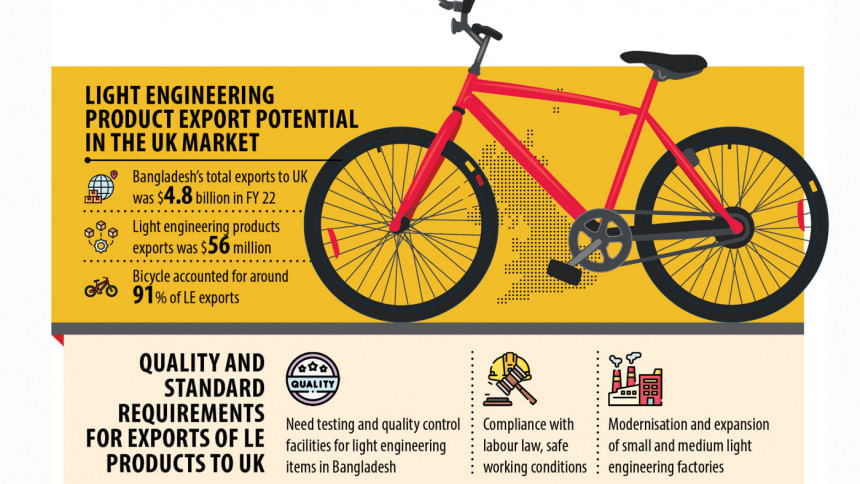UK’s new trade facility widens scope for non-garment exports

The Developing Countries Trading Scheme (DCTS) of the UK, a new trade facility replacing the Generalised System of Preferences (GSP) of the EU, could be a game-changer for Bangladesh to break into non-garment export sectors, especially light engineering.
The UK introduced the DCTS to extend tariff cuts to developing countries as part of its post-Brexit efforts to set up systems that replace those run by the EU.
Under the new scheme, Bangladesh enjoys free market access as a least-developed country, according to Mohammad Abdur Razzaque, chairman of the Research and Policy Integration for Development (RAPID), a think-tank.
"Even after Bangladesh graduates from the LDC category in 2026, the country will continue enjoying the same benefits until November 23, 2029."
Razzaque made this comment while delivering a presentation at a stakeholder consultation, styled "Expanding Exports to the UK Market", organised by the RAPID in collaboration with the UK's Foreign, Commonwealth and Development Office at the Sheraton Dhaka hotel yesterday.
Md Abdur Rahim Khan, additional secretary (export) of the ministry of commerce, Abdur Razzaque, president of the Bangladesh Engineering Industry Owners' Association, and Mohammad Mushtaque Ahmed Tanvir, president of the Bangladesh Bicycle and Parts Manufacturers and Exporters Association, also spoke.
The event was moderated by M Abu Eusuf, executive director of the RAPID.
Razzaque went on to say that the DCTS offers relaxed and liberal product-specific rules, extends cumulation facilities and allows inputs to be imported from 95 countries for final products that are eligible for duty-free access.
The DCTS also removes the requirement for countries to ratify and implement certain international conventions as a precondition for receiving trade preference.
After the LDC graduation and the additional three-year transition period, Bangladesh will still get duty-free benefits for more than 85 per cent of its UK-bound product lines under the DCTS Enhanced Preferences.
As part of the study, the RAPID has identified several potential export sectors for the UK market. Light engineering products are among the most prominent products that have yet to unleash their export potential.
There are about 40,000 light engineering industries in Bangladesh, employing around 600,000 workers, according to the Bangladesh Investment Development Authority.
Bangladesh exports a handful of light engineering products, with bicycles accounting for more than one-fourth of the sector's total export earnings.
Export receipts from light engineering products stood at $796 million in 2021-22.

 For all latest news, follow The Daily Star's Google News channel.
For all latest news, follow The Daily Star's Google News channel. 



Comments